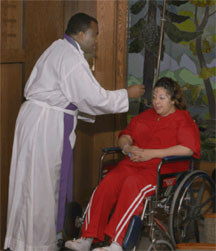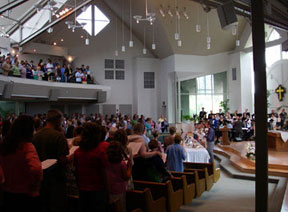My blog has moved! http://www.patheos.com/blogs/markdroberts/
|
 |
Twitter Feed for My Recent Blog Posts and Other Tweets |
My blog has moved! http://www.patheos.com/blogs/markdroberts/
|
God Bless John Wayne!?
By Mark D. Roberts | Saturday, February 28, 2009

Well, you don’t see that bumper sticker everyday. Oh, I suppose “Standing Tall” and “Let’s Roll” can be seen here and there, especially in Texas. But “God Bless John Wayne” is a rarity, at least in my experience.
I wonder if this proud Texan realizes that he’s asking the Almighty to bless a bona fide resident of Orange County, California! Not to mention an alumnus of Glendale High School, my alma mater!
Of course I’m afraid it’s a little late to ask God to bless Mr. Wayne. After all, he’s been dead for almost exactly 30 years.
Topics: Bumper Stickers | No Comments »
Do You Have to Give Up Something for Lent?
By Mark D. Roberts | Friday, February 27, 2009
Part 2 of series: How Lent Can Make a Difference in Your Relationship with God (2009)
Permalink for this post / Permalink for this series
 I grew up hearing about Catholics who had to fast during the season of Lent. No meat on Fridays, only fish. This, you must understand, was a costly sacrifice in the cafeteria of Glenoaks Elementary School! The fact that my Catholic friends had to give up decent food in Lent always seemed to me to be one more good reason to be a Protestant. (Photo: I expect that the Lent Promo at the Luby’s in Kerrville is much better than my elementary school’s cafeteria rations.)
I grew up hearing about Catholics who had to fast during the season of Lent. No meat on Fridays, only fish. This, you must understand, was a costly sacrifice in the cafeteria of Glenoaks Elementary School! The fact that my Catholic friends had to give up decent food in Lent always seemed to me to be one more good reason to be a Protestant. (Photo: I expect that the Lent Promo at the Luby’s in Kerrville is much better than my elementary school’s cafeteria rations.)
But, in the past fifteen years or so, I’ve sometimes decided to join my Catholic sisters and brothers in giving up something during Lent. This means, depending on how you count the days of Lent, fasting from something for about six weeks. (Officially in the Western world, Lent comprises the days from Ash Wednesday to Holy Saturday, the day before Easter. But many traditions do not count the Sundays during this period as belonging to Lent. Thus Lent covers 46 days, but only 40 days belong to the Lenten fast.)
People in my theological tradition (the Reformed tradition, pioneered by John Calvin) tend not to emphasize Lenten fasting. Partly this had to do with the conscious rejection of Roman Catholic practices that were not clearly based on Scripture. Lent is not prohibited in Scripture. But it isn’t taught there either. One can be a faithful, biblical Christian and never recognize Lent. So, in days gone by, many Reformed folk and other Protestants who wanted to make the season before Easter special in some way, chose instead to add a spiritual discipline to their lives as a way of preparing for Easter. It’s quite common today for churches that don’t have midweek Bible studies, for example, to offer a Lenten Wednesday Evening Study or something like this. Special Lenten spiritual retreats are also increasingly common in Protestant in addition to Roman Catholic circles.
But fasting still plays a prominent role in Lenten practices of many Christians across the denominational and theological spectrum. Throughout church history there have been different kinds of Lenten fasts. Nobody, to my knowledge, expected anyone to give up all food for the whole season. In the Middle Ages it was common for Christians to give up certain sorts of food, like meat and/or dairy products, for example. This explains why, in my youth, Catholics abstained from meat on the Fridays of Lent. Many Catholics still observe this discipline. In the Eastern Orthodox Church, the Lenten fast is taken even more seriously than in the Roman Catholic church, with many Orthodox folk eating vegetarian meals during the season.
 In recent years I have sometimes given up something in Lent, perhaps chocolate or watching television. The latter was particularly hard because I enjoy college basketball, and March Madness (the NCAA bastketball tournament) always falls in the middle of Lent. This year I have decided to give up something I enjoy. I’ve also adopted an additional daily spiritual discipline. It don’t think it would be appropriate for me to speak in detail about what I’m doing at this time. But I would like to share some reflections on what I’ve been learning through my version of a Lenten fast.
In recent years I have sometimes given up something in Lent, perhaps chocolate or watching television. The latter was particularly hard because I enjoy college basketball, and March Madness (the NCAA bastketball tournament) always falls in the middle of Lent. This year I have decided to give up something I enjoy. I’ve also adopted an additional daily spiritual discipline. It don’t think it would be appropriate for me to speak in detail about what I’m doing at this time. But I would like to share some reflections on what I’ve been learning through my version of a Lenten fast.
What I’ve Learned by Fasting During Lent
First, giving up something allows me to make a tangible sacrifice to the Lord. Although certain sacrifices are already present in my life, they’re sort of “built in” at this point. I don’t often experience giving up something for God on a daily basis. The act of sacrifice reminds me of my commitment to God and my desire to make him first in my life.
Second, by giving up something I usually enjoy on a daily basis, I have sometimes found myself yearning for that thing. Frankly, I’ve been tempted to give up my Lenten fast at times. I could easily argue that it’s unnecessary (it is optional, after all) and certainly not taught in Scripture. But, though I don’t think my effort at fasting makes God love or bless me more, I do think it raises my awareness of how much I depend on other things in life rather than the Lord. I see how easy it is for me to set up all sorts of little idols in my life. Fasting, in some way, helps me surrender my idols to God.
Third, when I give up something I like and then feel an unquenched desire for it, I’m reminded of my neediness as a person. And neediness, I believe, is at the heart of true spirituality. Jesus said:
“Blessed are the poor in spirit, for theirs is the kingdom of heaven. . . .
Blessed are those who hunger and thirst for righteousness, for they will be filled.”
Matthew 5:3, 6
Of course feeling hungry for one of life’s pleasures isn’t quite the same as hungering and thirsting for righteousness. But when I feel my hunger, when I sense my neediness for some other thing, I can use this to get in touch with my hunger and need for God.
Fourth, as I continue with my Lenten fast, I find myself less eager for the thing I’ve given up. Ironically, this makes my fast easier. It’s almost something I can take for granted, thus dulling the spiritual impact of the fast. But I’m also gratified to know that one of my little “idols” is being set aside in my heart, as I learn to depend more upon God. I’m experiencing a bit of freedom that makes me gladly thankful for God’s grace at work in me.
Adding a Lenten Discipline
Instead of or in addition to fasting during Lent, you might add a spiritual exercise or discipline to your life. If your church sponsors a Lenten Bible study, you might choose to join this study. Or you may want to participate in some act of kindness, such as feeding people at a homeless shelter.
I like to add something that I can do every day. It needs to be realistic, given my nature and patterns of life. So, for example, it would be a bad idea if I decided to get up at 5:00 a.m. to pray for an hour each day of Lent. This would stretch me so far that I’d surely fail. But I could take on additional Bible reading. Some years I’ve read one chapter of a gospel each day of Lent, taking it in slowly and meditating upon it. Other years I’ve used a Lenten devotional to focus my thought.
If you have no idea what to do during Lent, let me suggest the following. Set aside some time of quiet to as the Lord what he wants you to do. See if the Spirit of God guides you to something. If nothing comes to mind, I’d recommend that you read a chapter of a gospel each day. If you start with Mark, you’ll have time to read all of Mark plus all of one other gospel during Lent.
Perhaps some of my readers would like to suggest Lenten disciplines that they have tried in the past, and how they have experienced God’s grace through these exercises.
So, as we enter the season of Lent, I am grateful for the saints who have gone before me, some of whome discovered the blessings of giving up something in Lent, while others grew in their faith by adding a Lenten discipline. No matter what you do during this Lenten season, I pray that God will draw us closer to him, and prepare us for a fresh experience of Good Friday and Easter. May God’s peace be with You!
Topics: Holidays | 1 Comment »
How Lent Can Make a Difference in Your Relationship with God
By Mark D. Roberts | Thursday, February 26, 2009
Part 1 of series: How Lent Can Make a Difference in Your Relationship with God (2009)
Permalink for this post / Permalink for this series
Preface
For the past several years, I have followed my posts on Ash Wednesday with a discussion of Lent. I am doing the same this year. Some of what you read in this mini-series will repeat what I’ve done before (with needed edits). Some of what you read will be new. My point is to help my readers understand Lent. But, more importantly, I want to help people grow in their relationship with God through observing Lent in appropriate ways.
Introduction to Lent
Growing up as an evangelical Christian, I experienced Lent as little more than a joke. “What are you giving up for Lent?” my friends would ask. “Homework,” I’d say with a smirk, or “Obeying my parents.” Lent was one of those peculiar practices demanded of Roman Catholics - another great reason to be Protestant, I figured. It never even occurred to me that Lent was something I might actually be interested in, or benefit from, or decide to keep, or come to value as a way of getting to know God better.
In the last fifteen years I’ve discovered that Lent is in fact recognized by millions of Protestant Christians, in addition to Catholic and Orthodox believers. (The Eastern Orthodox Lent is longer than the Catholic or Protestant Lent, and it begins before Ash Wednesday.) Lent (the word comes from the Middle English word for “spring”) is a six-week season in the Christian year prior to Easter. (Technically, Lent comprises the 40 days before Easter, not counting the Sundays, or 46 days in total.)
In the ancient church, Lent was a time for new converts to be instructed for baptism and for believers caught in sin to focus on repentance. In time, all Christians came to see Lent as a season to be reminded of their need for penitence and to prepare spiritually for the celebration of Easter. Part of this preparation involved the Lenten “fast,” giving up something special during the six weeks of Lent (but not on Sundays, in some traditions.)
Historically, many Protestants rejected the practice of Lent, pointing out, truly, that it was nowhere required in Scripture. Some of these Protestants were also the ones who refused to celebrate Christmas, by the way. They wanted to avoid some of the excessive aspects of Catholic penitence that tended to obscure the gospel of grace. These Protestants saw Lent, at best, as something completely optional for believers, and, at worst, as a superfluous Catholic practice that true believers should avoid altogether.
A Pastoral Word: Let me note, at this point, that if you think of Lent as a season to earn God’s favor by your good intentions or good works, then you’ve got a theological problem. God’s grace has been fully given to us in Christ. We can’t earn it by doing extra things or by giving up certain other things in fasting. If you see Lent as a time to make yourself more worthy for celebrating Good Friday and Easter, then perhaps you shouldn’t keep the season until you’ve grown in your understanding of grace. If, on the contrary, you see Lent as a time to grow more deeply in God’s grace, then you’re approaching Lent from a proper perspective.
Some segments of Protestantism did continue to recognize a season of preparation for Easter, however. Their emphasis was not so much on penitence and fasting as on intentional devotion to God. Protestant churches sometimes added special Lenten Bible studies or prayer meetings so that their members would be primed for a deeper experience of Good Friday and Easter. Lent was a season to do something extra for God, not to give something up.
 After ignoring Lent for the majority of my life, I’ve paid more attention to it during the last two decades. Sometimes I’ve given up something, like watching television or eating sweets, in order to devote more time to Bible study and prayer. (The television fast was especially tough because I love watching March Madness, the NCAA basketball tournament, on TV.) Sometimes I’ve added extra devotional reading to my regular spiritual disciplines. I can’t claim to have had any mystical experiences during Lent, but I have found that fasting from something has helped me focus on God. It has also helped me to look ahead to Good Friday and Easter, thus appreciating more deeply the meaning of the cross and the victory of the resurrection. Before I began honoring Lent, Good Friday and Easter always seemed to rush by before I could give them the attention they deserved. Now I find myself much more ready to meditate upon the depth of Christ’s sacrifice and to celebrate his victory over sin and death on Easter.
After ignoring Lent for the majority of my life, I’ve paid more attention to it during the last two decades. Sometimes I’ve given up something, like watching television or eating sweets, in order to devote more time to Bible study and prayer. (The television fast was especially tough because I love watching March Madness, the NCAA basketball tournament, on TV.) Sometimes I’ve added extra devotional reading to my regular spiritual disciplines. I can’t claim to have had any mystical experiences during Lent, but I have found that fasting from something has helped me focus on God. It has also helped me to look ahead to Good Friday and Easter, thus appreciating more deeply the meaning of the cross and the victory of the resurrection. Before I began honoring Lent, Good Friday and Easter always seemed to rush by before I could give them the attention they deserved. Now I find myself much more ready to meditate upon the depth of Christ’s sacrifice and to celebrate his victory over sin and death on Easter.
Let me be very clear: Lent is not a requirement for Christians. Dallas Willard has said that if a certain optional spiritual discipline helps you grow in God’s grace, then by all means do it. But if it doesn’t, don’t feel like you must do it. I’d say the same about Lent. If it helps you prepare for a deeper celebration of Good Friday and Easter, if it allows you to grow in God’s grace, then by all means keep it. If Lent isn’t your cup of tea, then don’t feel obligated to keep it. You should realize, however, that millions of Christians – Catholic, Orthodox, Protestant, and Independent – have found that recognizing the season of Lent enriches our worship and deepens our faith in God.
In my next post in this series I’ll consider some of the symbolism of Lent, and suggest some possible Lenten practices to help you keep the season.
Topics: Holidays | 4 Comments »
Staring Death in the Face (2009)
By Mark D. Roberts | Wednesday, February 25, 2009
Permalink for this post / Permalink for this series
The denial of death . . . it’s all around us. When people die, they are often alone, sequestered in hospitals far away from the sad eyes of friends and family. If someone happens to die at home, the corpse is quickly sent away from the grieving relatives. In polite society one doesn’t talk much about death. And when it’s necessary to say something that has to do with dying, nifty euphemisms keep us from confronting the brute facts. When I lived in California, people would say, “Uncle Fred passed away.” In Texas, for some reason, people are more succinct, saying, “Uncle Fred passed.”
Of course our own fears concerning our own demise match our cultural squeamishness about death. We don’t want to think about our own mortality, and we do many things to pretend that its not approaching. We dye our graying hair. We cover our age spots with make up. We get cosmetic surgery to preserve the image of youth. Rarely do we seriously think about our own death. As a pastor, I’m amazed at how unusual it is for someone to make plans for his or her own memorial service, or even to leave notes for the family. These are things we’d rather not have to bother with.
I’m reminded about a story told by my friend Tim, who was a restaurant manager. Part of his job was to explain the company’s benefit package to his new employees. One time, Tim hired a young man who didn’t speak English very well because he had recently immigrated to the United States. Tim explained the vacation policy, sick leave, and health insurance, all without incident. Then he came to the life insurance. He showed that if the employee died, his family would get $25,000.
At this point the employee had a shocked look on his face, and said, “No, no, Tim!”
Tim wasn’t sure he had been clear, so he explained, once again, “Look, if you die, your family will get $25,000.”
Again, the employee was unhappy. “No, I don’t want it,” he said urgently.
“Why not?” Tim asked. “If you die, this will be good for your family.”
“But Tim,” the employee cried, “I don’t want to die!”
Ash Wednesday is a day when we stare death in the face. Christians who observe this holiday get ashes “imposed” on their foreheads, while a minister or lay church worker says, “You have come from dust, and to dust you will return.” In other words, “You are going to die. And here are some ashes to remind you, just in case you’ve forgotten.”
For sixteen years of Ash Wednesday services at Irvine Presyyterian Church, I put ashes on the heads of older adults, some of whom had serious cancer and didn’t live much longer. I also put tiny black crosses made of ash on the foreheads of babies far too young to realize what was happening to them. I imposed ashes on teenagers and senior citizens, on men and women, on boys and girls. All of these I reminded of their mortality, and they freely received the reminder. “You are dust,” I said, implying, “You are going to die.”
 What gives us such freedom to think about death? Are we Christians morose? Do we have some peculiar fascination with dying? I don’t think so. Rather, what allows us to stare death in the face is the assurance of life, real life, eternal life. When we know our lives are safe in the hands of God, and that this physical life is just the beginning of eternity, then we’re free to be honest about what lies ahead for us. We can face death without fear or pretending, because we know the One who defeated death.
What gives us such freedom to think about death? Are we Christians morose? Do we have some peculiar fascination with dying? I don’t think so. Rather, what allows us to stare death in the face is the assurance of life, real life, eternal life. When we know our lives are safe in the hands of God, and that this physical life is just the beginning of eternity, then we’re free to be honest about what lies ahead for us. We can face death without fear or pretending, because we know the One who defeated death.
I’ll never forget my last visit with a dear member of my congregation named Helen. She was a tiny woman when healthy, but old age and disease had ravaged her body. I wouldn’t be surprised if she weighed 75 pounds on the day of my last visit.
There was no question that Helen was soon to die. And there was no point for me to pretend as if that weren’t true. So I asked her straightaway: “Helen, it’s obvious that you don’t have too much time left in this body. How are you feeling about dying?”
“Mark,” she said with a weak but confident voice, “I’ve lived a good, long life. I’ve been blessed far beyond what I could have hoped. You’re right, my body is giving out. I don’t have much longer to live. But I want you to know that I am ready. I’m not afraid. I’m eager to see my Lord. I hope I get to soon.”
Talk about staring death in the face! What gave Helen such unusual bluntness and boldness when it came to her own imminent death? Her faith in God. Her confidence that her life was really just beginning. Her assurance that her soul was safe in the hands of a gracious, loving God.
And so it is for Christians on Ash Wednesday. We can face death. We can admit our own mortality. We can talk openly about the limits of this life. Why? Because we know that through Christ we have entered into life eternal, the fullness of life that will not end when our bodies give out.
 The emotional result of Ash Wednesday observance isn’t depression or gloom, but gratitude and new energy for living. When we realize how desperately we need God, and how God is faithful far beyond our desperation, we can’t help but offering our lives to him in fresh gratitude. And when we recognize that life doesn’t go on forever, then we find new passion to delight in the gifts of each and every day, and to take none of them for granted.
The emotional result of Ash Wednesday observance isn’t depression or gloom, but gratitude and new energy for living. When we realize how desperately we need God, and how God is faithful far beyond our desperation, we can’t help but offering our lives to him in fresh gratitude. And when we recognize that life doesn’t go on forever, then we find new passion to delight in the gifts of each and every day, and to take none of them for granted.
One year, as I returned to my seat after imposing ashes upon dozens of worshipers, I sat next to my 12-year-old son. I couldn’t help but notice the prominent black cross on his forehead, placed there by another leader. All of a sudden it hit me that my dear boy will die someday. Though I knew this in principle, I had never really thought about it before. My boy won’t live forever. His life, like mine and that of every other human being, will come to an end. At that moment I prayed that God would give Nathan a long and blessed life. And then I hugged him for a good minute, treasuring the life we share together.
How grateful I am for the grace of God that allows us to stare death in the face so we can live with greater passion and delight! And how thankful I am for a day that allows me to think about death so I can cherish life even more!
Topics: Holidays | 7 Comments »
What is Ash Wednesday?
By Mark D. Roberts | Tuesday, February 24, 2009
Permalink for this post / Permalink for this series
Tomorrow is Ash Wednesday. As has been my tradition for several years, in today’s post I will explain some of the basics about this holy day. Tomorrow I’ll add some Ash Wednesday reflections.
What is Ash Wednesday? For most of my life, I didn’t ask this question, nor did I care about the answer. I, along, with most evangelical Christians in America, didn’t give Ash Wednesday a thought.
But then, in 2004, Ash Wednesday loomed large in American Protestant consciousness. Why? Because on that day Mel Gibson released what was to become his epic blockbuster, The Passion of the Christ. For the first time in history, the phrase “Ash Wednesday” was on the lips of millions of evangelical Christians, not just Catholics and other “high church” Protestants, as we anticipated the official release of The Passion.
I grew up with only a vague notion of Ash Wednesday. To me, it was some Catholic holy day that I, as an evangelical Protestant, didn’t have to worry about, thanks be to God. In my view, all of “that religious stuff” detracted from what really mattered, which was having a personal relationship with Jesus Christ. In my early evangelical years it never dawned on me that some of “the religious stuff” might actually enrich my faith in Christ.
 During the spring of 1976, my first year of college, I was startled to see a woman who worked in my dining hall with a dark cross rubbed on her forehead. At first I wondered if it were a bizarre bruise. Then I noticed other women with similar crosses. It finally dawned on me what I was seeing. Here was my introduction to Ash Wednesday piety. These women, who were are Roman Catholic, had gone to services that morning and had ashes placed on their foreheads. I felt impressed that these women were willing to wear their ashes so publicly, even though it seemed a rather odd thing to do. It never dawned on me that this would be something I might do myself one day.
During the spring of 1976, my first year of college, I was startled to see a woman who worked in my dining hall with a dark cross rubbed on her forehead. At first I wondered if it were a bizarre bruise. Then I noticed other women with similar crosses. It finally dawned on me what I was seeing. Here was my introduction to Ash Wednesday piety. These women, who were are Roman Catholic, had gone to services that morning and had ashes placed on their foreheads. I felt impressed that these women were willing to wear their ashes so publicly, even though it seemed a rather odd thing to do. It never dawned on me that this would be something I might do myself one day.
Fast forward sixteen years, to the spring of 1992. During my first year as Senior Pastor of Irvine Presbyterian Church, I learned that this church had a tradition of celebrating Ash Wednesday with a special worship service. It included the “imposition of ashes” on the foreheads of worshippers. I, as the pastor, was expected to be one of the chief imposers! So I decided it was time to learn about the meaning of Ash Wednesday. I wanted to be sure that the theological underpinnings of such a practice were biblically solid, and that it was something in which I could freely participate.
Here’s some of what I learned . . . .
Ash Wednesday is a Christian holiday (holy day) that is not a biblical requirement (rather like Christmas and Easter). Nevertheless, it has been honored by Christians for well over ten centuries at the beginning of Lent, a six-week season of preparation for Easter. In the earliest centuries, Christians who had fallen into persistent sin had ashes sprinkled on their bodies as a sign of repentance, even as Job repented “in dust and ashes” (Job 42:6). Around the tenth century, all believers began to signify their need for repentance by having ashes placed on their foreheads in the shape of a cross. Notice: even this sign of sinfulness hinted at the good news yet to come through its shape. Ash Wednesday is not some dour, depressing holy day because it symbolically anticipates Good Friday and Easter.
Today, celebrations of Ash Wednesday vary among churches that recognize this holiday. More and more Protestant and even evangelical churches hold some sort of Ash Wednesday services. At Irvine Presbyterian Church, where I served for sixteen years as pastor, and at St. Mark Presbyterian Church in Boerne, Texas, where I now attend, ashes are placed on our foreheads as a reminder of our mortality and sinfulness. The person who imposes the ashes quotes something like what God once said to Adam after he had sinned: “You are dust, and to dust you shall return” (Gen 3:19). This is the bad news of our sinfulness that prepares us to receive the good news of forgiveness in Christ.
 What I value most about Ash Wednesday worship services is the chance for us all to openly acknowledge our frailty and sinfulness. In a world that often expects us to be perfect, on Ash Wednesday we freely confess our imperfections. We can let down our pretenses and be truly honest with each other about who we are. We all bear the mark of sin, from the youngest babies to the oldest seniors. We all stand guilty before a holy God. We all are mortal and will someday experience bodily death. Thus we all need a Savior.
What I value most about Ash Wednesday worship services is the chance for us all to openly acknowledge our frailty and sinfulness. In a world that often expects us to be perfect, on Ash Wednesday we freely confess our imperfections. We can let down our pretenses and be truly honest with each other about who we are. We all bear the mark of sin, from the youngest babies to the oldest seniors. We all stand guilty before a holy God. We all are mortal and will someday experience bodily death. Thus we all need a Savior.
Perhaps one of the greatest benefits of Ash Wednesday is that it begins the season of Lent. This is also a foreign concept for many evangelical Christians. In a couple of days I’ll weigh in on the meaning and benefit of Lent. Tomorrow I’ll stay focused on Ash Wednesday.
Topics: Holidays | 3 Comments »
Slumdog Millionaire Wins!
By Mark D. Roberts | Monday, February 23, 2009
 Slumdog Millionaire prevailed at last night’s Oscars, winning eight academy awards, including Best Director and Best Picture. It beat a strong field of films, including my personal favorite, Frost/Nixon. But I was pleased that Slumdog Millionaire won. It’s a fine movie, wonderfully filmed and acted.
Slumdog Millionaire prevailed at last night’s Oscars, winning eight academy awards, including Best Director and Best Picture. It beat a strong field of films, including my personal favorite, Frost/Nixon. But I was pleased that Slumdog Millionaire won. It’s a fine movie, wonderfully filmed and acted.
Some of the promotional material for the movie proclaims: The Feel Good Movie of the Decade! There is a sense in which this is true. But if you haven’t seen the movie, I would warn you that it is not an easy film to watch. Though it is not sexually-explicit and the bad language is limited, Slumdog Millionaire deserves its R rating, in my opinion, because of its “violence and disturbing images.”
Nevertheless, I would recommend this film to mature viewers because it tells a moving story. In some ways it is a love story. It also paints an engaging picture of a culture far different from the one I know. In watching Slumdog Millionaire, I found myself transported to a very different place and way of life.
Topics: Movies | 2 Comments »
Sunday Inspiration from The High Calling
By Mark D. Roberts | Sunday, February 22, 2009
Worshiping God in Our Daily Lives
Who may worship in your sanctuary, LORD?
Who may enter your presence on your holy hill?
Those who lead blameless lives and do what is right,
speaking the truth from sincere hearts.
Psalm 15 begins with the question of who may worship in God’s sanctuary. The answer: “Those who lead blameless lives and do what is right” (v. 2). Then the psalm lists examples of the kind of righteous living that should characterize those who worship God, beginning with “speaking the truth from sincere hearts.”
Because of what Christ has done for us on the cross, we do not need to live blamelessly in order to approach God in worship. We come before him in the freedom of divine mercy, knowing that we are forgiven because of Christ’s death for us. However, this does not mean our daily lives are irrelevant to our worship. On the contrary, we who worship God in our “sanctuary” are also called to worship him in our daily lives. As we present ourselves to God when we are gathered together as the people of God, we are preparing our hearts to worship him when we are scattered throughout the world. Thus our worship on Sunday inspires our worship each day. We honor God by the way we act among our families, friends, and colleagues. We worship him through offering each and every action to him. So, for example, we worship God by being people who speak the truth from sincere hearts.
Surely it’s easier to think of worship as something we do for an hour a week in church. The idea of worshiping God throughout the week can feel intimidating. But it can also transform our lives, giving new purpose and meaning even to the humdrum demands of daily life.
QUESTIONS FOR REFLECTION: Do you think of worship as something you can do each and every day? Why or why not? What helps you to think of your daily life as a context for worshiping God?
PRAYER: Dear Lord, first of all I must thank you for the fact that I don’t have to live blamelessly in order to worship you. How grateful I am for the forgiveness you offer through Christ. How good it is to know that I can approach you, not in my own righteousness, but in the righteousness of the One who died for me.
In response to the grace you have poured out upon me, I owe you worship. Not just the worship of the “sanctuary,” but the worship of everyday life. O Lord, may I learn to worship you each moment of each day. Teach me to see my whole life as one great worship service, in which I honor you through every word, every thought, every deed. By your grace, may I learn to present my body to you as a living sacrifice, so that you might be glorified in every part of my life. I pray in the name of Jesus my Savior, Amen.
Daily Reflections from The High Calling.org
This devotional comes from The High Calling of Our Daily Work (www.thehighcalling.org). You can read my Daily Reflections there, or sign up to have them sent to your email inbox each day. This website contains lots of encouragement for people who are trying to live out their faith in the workplace.
Topics: Sunday Inspiration | No Comments »
Why Are Protestants More Loyal to Their Toothpaste Than to Their Denomination? Section 2
By Mark D. Roberts | Friday, February 20, 2009
Part 3 of series: Denominations, Toothpaste, and Toilet Paper
Permalink for this post / Permalink for this series
Yesterday I began reflecting on the recent discover that Protestants in American are more loyal to their toothpaste than to their denomination. I suggested that, for many of us, we consider our “brand” to be Christian rather than “Presbyterian” or “Methodist” or whatever. But I believe there are other reasons why Protestants are happier to switch denominations than from Crest to Colgate.
Denominations are an Inconsistent Brand
Brands, it seems to me, get loyalty by consistency. I must confess that I frequent the McDonald’s brand of fast food. Partly it’s a matter of convenience. Partly it’s because McDonald’s places franchises in airport terminals. Partly it’s because almost all McDonald’s now have Wi-Fi Internet connections. And, partly it’s because McDonald’s is consistent.
 In fact, McDonald’s is tediously consistent. You can almost always count on McDonald’s to be conveniently located and scrupulously clean. The menu, conspicuously located on the wall, is virtually identical to the menu in any other McDonald’s venue. This is true even if you travel overseas, with some notable exceptions. I remember once going to a McDonald’s in Switzerland and being surprised to find beer on the menu. And even throughout the U.S. you can sometimes discover regional differences among McDonald’s menus. But, for the most part, a Big Mac is a Big Mac is a Big Mac. Period. You can count on it. (Photo: A tray of European McDonald’s food, including beer.)
In fact, McDonald’s is tediously consistent. You can almost always count on McDonald’s to be conveniently located and scrupulously clean. The menu, conspicuously located on the wall, is virtually identical to the menu in any other McDonald’s venue. This is true even if you travel overseas, with some notable exceptions. I remember once going to a McDonald’s in Switzerland and being surprised to find beer on the menu. And even throughout the U.S. you can sometimes discover regional differences among McDonald’s menus. But, for the most part, a Big Mac is a Big Mac is a Big Mac. Period. You can count on it. (Photo: A tray of European McDonald’s food, including beer.)
The same is true with toothpaste brands, by the way. Crest in Massachusetts is the same as Crest in California. Colgate in Texas is just like Colgate in Wisconsin. Trustworthy brand consistency.
 But not when it comes to Protestant denominations. You can usually find a wide variety of church experiences within any single denomination. Take my denomination, for example, the Presbyterian Church (USA). Just look at us. You can find Gothic or Georgian Presbyterian churches that are well over a hundred years old, and ultra-modern churches built within the last decade. They look nothing alike, and there’s no way you can be sure from a distance what sort of church you’re seeing. If, on the other hand, you catch a glimpse of the golden arches along the highway, you know you’re passing a McDonald’s restaurant. (Photo: You know exactly where I was having lunch. But you can’t be sure what brand of church was across the street. You get extra credit if you can tell me where this church is and identify it’s denomination. Clue: This is one of my favorite towns.)
But not when it comes to Protestant denominations. You can usually find a wide variety of church experiences within any single denomination. Take my denomination, for example, the Presbyterian Church (USA). Just look at us. You can find Gothic or Georgian Presbyterian churches that are well over a hundred years old, and ultra-modern churches built within the last decade. They look nothing alike, and there’s no way you can be sure from a distance what sort of church you’re seeing. If, on the other hand, you catch a glimpse of the golden arches along the highway, you know you’re passing a McDonald’s restaurant. (Photo: You know exactly where I was having lunch. But you can’t be sure what brand of church was across the street. You get extra credit if you can tell me where this church is and identify it’s denomination. Clue: This is one of my favorite towns.)
And that’s just the outside. You’ll find just as much variation on the inside. Some Presbyterian churches worship in traditional sanctuaries with hardwood pews and large pipe organs. Other Presbyterian churches worship in worship centers or school auditoriums with folding chairs and rock bands. Many Presbyterian churches offer both extremes. And then there’s everything in between.
You might expect a fair amount of theological consistency within denominations. This may be true for some, but not in the PC(USA) and similar mainline denominations. Some of our churches are very conservative theologically, holding the Bible as the infallible or inerrant Word of God and salvation to be found only in Jesus Christ. Other PC(USA) churches accept the Bible as one, fallible authority among many, and believe that people can be saved in a wide variety of ways. I know Presbyterian pastors who believe that all people will be saved no matter whether they have a relationship with Christ or not. And I know Presbyterian pastors who think that one must have an explicit faith in Christ in order to be saved.
Let me offer one more salient example that features the “pet issue” of the PC(USA). A good friend of mine is a Presbyterian pastor who upholds biblical authority even when it’s unpopular. Thus he believes that sex outside of heterosexual marriage is wrong and is willing to say so when needed. He doesn’t spend much time preaching about sex. But when he does, he speaks plainly in light of his convictions.
Several years ago my friend was preaching on a passage that dealt with marriage. During his sermon, he mentioned briefly that Scripture does not support sexual intimacy outside of marriage between a man and a woman. At that moment, a couple stood up and left the church service, obviously intending to express their public disapproval of my friend’s point. The couple had been visiting, and, obviously, they never came back. Some time later my friend learned that the man who left was a Presbyterian pastor from another part of the country. Not only did he disagree with my friend, but he did so with enough passion to march out of the service.
This story illustrates one more way that the Presbyterian Church (USA), like most mainline denominations, is utterly diverse. If you visit a PC(USA) congregation next Sunday, you’ll have no way of knowing in advance what that church teaches about human sexuality.
So the Presbyterian “brand” is terribly inconsistent, even within one branch of American Presbyterianism. It gets more complicated when you remember that there are multiple Presbyterian denominations. This means that if you move from one place to another, you simply cannot predict whether the Presbyterian church in your new community will be anything like the one in your former community. In fact, the Methodist church in your new town may be much more like the Presbyterian church in your former town than the Presbyterian church in the new town.
The inconsistency of denominational brands has much to do with the lack of denominational loyalty among Protestants in America. You’d find the same with toothpaste if it varied as widely as churches. If Crest in California tasted like mint, while Crest in Texas tasted like bubblegum, you can be fairly sure that Crest lovers from one state would switch brands when they moved to the other state.
Topics: Denominations & Toothpaste | 13 Comments »
Why Are Protestants More Loyal to Their Toothpaste Than to Their Denomination?
By Mark D. Roberts | Thursday, February 19, 2009
Part 2 of series: Denominations, Toothpaste, and Toilet Paper
Permalink for this post / Permalink for this series
In yesterday’s post I summarized the results of an Ellison Research that found American Protestants to be more loyal to their brand of toothpaste than to their brand of church (i.e. denomination). Although I have neither the technical details nor the expertise to evaluate the accuracy of these findings, they make sense to me intuitively and experientially.
For sixteen years I was the Senior Pastor of Irvine Presbyterian Church (PCUSA). During that time we received something like a thousand new members. I met most of these in our new members’ class, and heard something of their religious background. I’d guess that, at most, a third of those joining our church had been Presbyterians before. The solid majority came from a wide range of religious traditions, including: Baptist, Roman Catholic, Episcopalian, Methodist, Vineyard, and non-denominational. Some of our new members had been raised as Jews, Muslims, or atheist/agnostics. Even those who had been Presbyterian did not chose our church primarily because it was the only Presbyterian church in town. Their Presbyterian background got them to visit, but they were joining because they affirmed our vision, connected with our people, and felt drawn to God through our worship and other ministries.
So it doesn’t surprise me that only 16% of Protestants are so loyal to their denomination that, if they moved, they would only consider a new church within their denomination. Nevertheless, it’s worth wondering why this is so. I can think of many reasons, several of which were anticipated by yesterday’s commenters.
The language of the Ellison Research study used the language of branding. People are more loyal to their brand of toothpaste than their brand of church, that is, their denomination. This conclusion suggests a fundamental question:
What is my brand of church?
Many people, including the Ellison Research folk, would say that my brand is Presbyterian. That is true, in a way. But it is also profoundly untrue, in another way. Let me explain.
Yes, I’ve been a Presbyterian for most of my life, though I was baptized a Methodist and attended Assembly of God, Catholic, and Mennonite churches while in college and grad school. Nevertheless, as an ordained minister of Word and Sacrament in the Presbyterian Church (USA), I’m about as Presbyterian as one can get. I have served in Presbyterian churches for the last 25 years and continue to be active in a Presbyterian church even though I’m no longer on the staff.
Yet I don’t think of myself primarily as a Presbyterian, but as a Christian. I am first and foremost a disciple of Jesus Christ. My basic brand, as I think of it, is Christian, not Presbyterian. In my current position as Senior Director of Laity Lodge, I am regularly interacting with Methodists, Episcopalians, Baptists, and others. I join them in worship either in their churches or at Laity Lodge. Inevitably, what I experience in these settings is the sense of just how much we have in common as Christians. What we have in common is much more pronounced that where we differ. Sure, the Episcopalians use wine in the Eucharist, while the Presbyterians use grape juice in the Lord’s Supper, but we are united in remembering Christ’s death for us and in our reliance on his grace.
When I was senior pastor of Irvine Presbyterian Church, I made no effort to build brand loyalty to Presbyterianism. I wanted my church members to be loyal first and foremost to Jesus Christ. I rarely talked about the Presbyterian Church and its benefits. Instead, I talked endlessly about Christ and his benefits.
Moreover, when people moved away from our area and sought my advice about churches where they lived, I never limited my recommendations to Presbyterian churches. Yes, I did always try to find some strong Presbyterian churches in their region. But it was not my goal as their pastor to make sure they remained Presbyterian. Rather, I wanted them to be in healthy, Christ-centered, Bible-based, gospel-driven churches, no matter the denomination. I’ll admit that I was usually just a bit happier when folks who moved away joined a strong Presbyterian church. But my main concern was for the quality of church, not its denominational label.
 I remember one time, in particular, when friends from Irvine moved to a suburb of Chicago. Jim and Sherry were died-in-the-wool Presbyterians who had been valuable leaders at Irvine Presbyterian Church. There was, in fact, a Presbyterian church in their new town. But it was relatively lifeless. Moreover, it’s youth ministry was pathetic, and my friends had three teenagers. Jim and Sherry tried other Presbyterian churches nearby, but found more or less the same situation. (Photo: Worship at Irvine Presbyterian Church)
I remember one time, in particular, when friends from Irvine moved to a suburb of Chicago. Jim and Sherry were died-in-the-wool Presbyterians who had been valuable leaders at Irvine Presbyterian Church. There was, in fact, a Presbyterian church in their new town. But it was relatively lifeless. Moreover, it’s youth ministry was pathetic, and my friends had three teenagers. Jim and Sherry tried other Presbyterian churches nearby, but found more or less the same situation. (Photo: Worship at Irvine Presbyterian Church)
 Almost in desperation, they decided to visit Willow Creek Community Church, a “seeker-sensitive” megachurch not to far from their home. The Sunday morning worship service hardly felt like church to them, though they had positive things to say about the quality of the sermon. But their children loved the youth groups. These weren’t just about entertaining program, but rather were committed to helping young people become Christians and grow in their Christian faith. After several visits to Willow Creek, Jim and Sherry felt terribly confused. Should they leave the Presbyterian denomination? How could they abandon their denomination for a non-denominational megachurch. (Photo: Worship at Willow Creek Community Church.)
Almost in desperation, they decided to visit Willow Creek Community Church, a “seeker-sensitive” megachurch not to far from their home. The Sunday morning worship service hardly felt like church to them, though they had positive things to say about the quality of the sermon. But their children loved the youth groups. These weren’t just about entertaining program, but rather were committed to helping young people become Christians and grow in their Christian faith. After several visits to Willow Creek, Jim and Sherry felt terribly confused. Should they leave the Presbyterian denomination? How could they abandon their denomination for a non-denominational megachurch. (Photo: Worship at Willow Creek Community Church.)
When Jim and Sherry called me for advice, I listen to their experiences and concerns. After they were finished, I asked one question: “Where do you think your children will be helped in their growth as disciples of Jesus?” Their answer was unequivocal: “At Willow Creek.” My response was equally unequivocal: “Then that’s where you should go.” Did I wish they had found a good Presbyterian church? I expect so. But as long as Jim, Sherry, and their children were going to a Christian church, and an excellent one at that, then I wasn’t concerned that they were switching brands. At the deepest level, and the one that matters most, they were staying with the “Christian brand.”
In my conversation with Jim and Sherry, I also realized that, in some ways, I sensed more “brand loyalty” to Willow Creek than to certain churches in my own denomination. I’ll say more about this in my next post.
At any rate, I would answer the question: Why are Protestants more loyal to their toothpaste than to their denomination? by saying this: For many Protestants, the brand of “Christian” means far more than any denominational label. They are, first and foremost, Christians, and not Presbyterians or Methodists or Baptists.
Topics: Denominations & Toothpaste | 5 Comments »
Denominations, Toothpaste, and Toilet Paper: Just the Facts, Ma’am
By Mark D. Roberts | Wednesday, February 18, 2009
Part 1 of series: Denominations, Toothpaste, and Toilet Paper
Permalink for this post / Permalink for this series
A recent USA Today headline caught my eye: “U.S. Protestants more loyal to toothpaste brand than church?” Ouch! This isn’t something that a clergyman from a Protestant denomination wants to read in the morning paper. But, like it or not, I did read the USA Today story. And, like it or not, I did discover that American Protestants are more loyal to their toothpaste brand than to their denomination. Also to their toilet paper. Double ouch!
If you’ve been reading my blog for a while, you know that I weigh in occasionally on the nature and condition of Christian denominations. For example:
What’s Good About Denominations?
So, given my interest in denominational tidings, I thought chip in my two cents on the issue of denominations and toothpaste.
First, the facts. The USA Today story was based on a study done by Ellison Research of Phoenix, Arizona. From their website, it appears that Ellison Research is primarily a marketing research firm for business clients, with several non-profit clients as well. Ellison Research specializes in studies for Christian organizations, and claims familiarity with the Christian community.
The research on Christian denominations and toothpaste was published on January 12, 2009. It was based on a survey of 1007 American adults, including 471 regular churchgoers. A summary of findings can be found in a press release (PDF format).
Overall, Ellison Research found that 30% American churchgoers would consider only one denomination. This figure includes Roman Catholics, who are much more loyal than Protestants. 60% of Catholics would consider attending only a Catholic church. Meanwhile, only 16% of Protestants exhibit this kind of denominational loyalty, though 67% of Protestants have some sort of denominational preference.
What is perhaps even more surprising to me is that Protestants who attend non-denominational churches are much more committed to being non-denominational than Protestants who are allied with a denomination. Here’s what Ellison Research found:
People who worship at a non-denominational congregation were asked the same question about their loyalty to attending a non-denominational church. People who attend a non- denominational church are actually more loyal to remaining non-denominational than churchgoers in Protestant denominations are to staying within their own denomination.
In fact, 29% of non-denominational churchgoers would only consider a non-denominational church.
 Ellison Research then asked churchgoers about their loyalty to other “brands” beside churches. As it turns out, Protestants are more loyal to their denomination than to their favored brands of fast food restaurants (3%), bottled water (7%), computers (9%), and soft drinks (14%). Yet denominational loyalty ranks below Protestant loyalty to brands of toothpaste (22%) and toilet paper (19%). (Photo: Yes, you can even get toilet paper that comes in a toothpaste-type tube. I wonder if that raises the level of brand loyalty.)
Ellison Research then asked churchgoers about their loyalty to other “brands” beside churches. As it turns out, Protestants are more loyal to their denomination than to their favored brands of fast food restaurants (3%), bottled water (7%), computers (9%), and soft drinks (14%). Yet denominational loyalty ranks below Protestant loyalty to brands of toothpaste (22%) and toilet paper (19%). (Photo: Yes, you can even get toilet paper that comes in a toothpaste-type tube. I wonder if that raises the level of brand loyalty.)
So, there you have, in the iconic words of Joe Friday, “just the facts, ma’am.” Denominational loyalty is lower than toothpaste and toilet paper loyalty. So what does this mean? What should we think of this? Is it bad? Good? Neutral? Tomorrow I’ll offer some thoughts on the implications of “just the facts.”
Topics: Denominations & Toothpaste | 16 Comments »
Don’t Swing Too Far on the Pendulum
By Mark D. Roberts | Tuesday, February 17, 2009
Part 8 of series: Advice for Pastor Search Committees
Permalink for this post / Permalink for this series
I’m going to wrap up this series today, at least for now. As always, I reserve the right to come back to this subject in the future.
So far, I’ve suggested that pastor search committees should:
1. Seek first the kingdom of God.
2. Pray without ceasing.
3. Be open to God’s surprises.
4. Exercise endurance and beware of exhaustion.
5. Represent your church accurately.
6. Get the true “downside” on candidates.
7. Realize you can’t have it all.
Today I offer this bit of advice:
8. Don’t swing too far on the pendulum.
 The pendulum of which I speak is that of change. In particular, I’m recommending that pastor search committees do not overreact to the weaknesses of the preceding pastor, thus swinging way too far out on the pendulum of change.
The pendulum of which I speak is that of change. In particular, I’m recommending that pastor search committees do not overreact to the weaknesses of the preceding pastor, thus swinging way too far out on the pendulum of change.
I’ve seen it happen too many times. To cite one example, about ten years ago I watched a church call a new senior pastor. The preceding pastor, a man I’ll call Vince, had been a fine teacher/preacher and an expert in pastoral care. But he was an abominable administrator. In fact, he didn’t even pretend to have administrative gifts. He left that to others on the staff along with some gifted lay leaders. Under Vince’s leadership, the church grew in size and in depth. But when he moved on, the search committee saw an opportunity to call a pastor with more administrative ability and interest. They intentionally sought such a pastor. The person they found, whom I’ll call Eric, was a decent preacher and an outstanding administrator. He was not especially strong in pastoral care, but he had done well in his previous church, which thrived under his leadership. So the search committee called Eric as the new pastor of their church, convinced that he would be outstanding.
No doubt you can see where this story is going. Eric’s time at the church was a train wreck. The congregation missed Vince’s strong preaching and teaching. The staff and lay leaders of the church were not at all ready for Eric’s administrative leadership. And everybody missed the highly personal care they had received from Vince. Though Eric did exactly what he had been told was needed at the church – provide visionary leadership – he found that few wanted to follow him. He lasted a couple of years in the church, years that were painful for all concerns.
I’m glad to say that the next time around, the search committee for this church took a more balanced approach. They called a pastor, Jim, who was a strong preacher, much as Vince had been. Jim was a solid administrator, but not as assertive as Eric had been. Jim was also strong in pastoral care, though not as involved in the lives of the congregation as Vince had been. In sum, Jim was more administratively capable than Vince, but much more like Vince than Eric had been. His tenure at the church has been a positive and productive one.
Sometimes search committees err by looking for someone just like the preceding pastor. Sometimes they err by looking for someone way too different. In my opinion, committees need to evaluate very carefully the positive impact of the former pastor. If, for example, that pastor was a strong preacher, chances are that the congregation values preaching highly, and will need the next pastor to be a strong preacher as well. The same would be true for other pastoral qualities: visionary leadership, management, discipleship, pastoral care, evangelism, program organization, etc. I’m not meaning to imply that the new pastor should be just like the old one, whatever this might mean. But that which the congregation most valued in the former pastor certainly shouldn’t be a weak suit for the next pastor.
Sometimes the pendulum swing isn’t so much about pastoral abilities as it is about vision or mission. If a former pastor was perceived as being too evangelistic, thus neglecting care of the flock, the committee might be tempted to call a pastor who paid too little attention to evangelism. Or if a former pastor is perceived to be too conservative theologically, the committee might overcompensate by seeking someone too liberal for the church. Or of the predecessor is believed to have been too old, the committee might seek someone too young. Et cetera, et cetera, et cetera.
Of course if the former pastor had serious moral problems, then a search committee should go ahead and take a big swing on the pendulum. If, for example, the last pastor was dishonest, it’s absolutely right to seek a new pastor who is impeccable when it comes to honesty. I’m not suggesting that committees look for pastors who are mostly truthful, or mostly faithful to their spouses, or mostly legal in their approach to finances. When it comes to matters of moral character or theological orthodoxy, committees are well advised to be uncompromising.
I’ve already dealt with the problem of committees who think they can have it all. Naively, they want someone with all of the strengths of the predecessor, and none of the weaknesses. This is a formula for disaster. Once again, I’d recommend that committees work extremely hard on discerning the pastoral strengths that are most essential for their church. This kind of realistic evaluation will enable the committee to seek and, by God’s grace, to find a pastor well-suited to their congregation.
Topics: Pastor Search Committees | No Comments »
Closed on Sunday
By Mark D. Roberts | Monday, February 16, 2009
 As I was driving along in San Antonio recently, I glimpsed a sign that grabbed my attention. Since I wasn’t quite sure I saw it right, I did a big loop to confirm my I had seen (not an easy task with San Antonio frontage roads, by the way). Sure enough, at the Las Palapas restaurant along 1604 in north San Antonio, there were two unusual signs.
As I was driving along in San Antonio recently, I glimpsed a sign that grabbed my attention. Since I wasn’t quite sure I saw it right, I did a big loop to confirm my I had seen (not an easy task with San Antonio frontage roads, by the way). Sure enough, at the Las Palapas restaurant along 1604 in north San Antonio, there were two unusual signs.
One of the signs read: “More Valuable: A Good Reputation than Riches.” This is a paraphrase of Proverbs 22:1, which reads in the NLT: “Choose a good reputation over great riches, for being held in high esteem is better than having silver or gold.”
The other sign read: “Open 24 Hours. Closed Sunday: Family and Worship.” Now you don’t see that sort of thing every day, even in Texas. When I lived in Irvine, I remember one business that closed on Sunday - a bread shop owned by Mormons.
 After I got home from San Antonio, I did a little research on Las Palapas.
After I got home from San Antonio, I did a little research on Las Palapas.
First, a “palapa” is an open-sided, thatched-roof structure that you’d find on a tropical island. It’s sometimes called a tiki hut. The word seems to come from a “American Spanish” word for palm tree.
Las Palapas is a Tex-Mex restaurant chain in San Antonio, with eleven locations. It was founded in 1981 by Ron Acosta. Here’s how the Las Palapas website explains its Sunday closing policy:
Las Palapas began closing on Sunday to allow employees time with families and an opportunity to worship if they so desire. According to Ron, honoring God is not just about closing on Sundays it is about identifying people everyday with needs and then doing what you can to help them. Ron attributes his success to the grace of God.
I noticed that Las Palapas promotes a charitable foundation called Jireh, with the tag line: “Serving Widows and Orphans.” Here’s the website data on Jireh:
Many people have helped Ron during the seasons of his life and because of this he has a desire to give back to others. Therefore, Ron and his wife Elssy founded the Jireh Foundation, to assist in caring for widows and orphans. Throughout the city of San Antonio, there are widows and orphans that the Jireh Foundation helps support financially on a monthly basis. Jireh also assists many other non-profit organizations and businesses in the San Antonio community.
The word “Jireh” comes from the Hebrew verb that means “to see,” or sometimes “to provide.” It is used as a name for God in Genesis 22:14. The KJV reads: “And Abraham called the name of that place Jehovah-jireh: as it is said to this day, In the mount of the LORD it shall be seen.” A few verses earlier, jireh [now transliterated as yireh] is rendered in the KJV as “to provide” - “And Abraham said, My son, God will provide [yireh] himself a lamb for a burnt offering: so they went both of them together” (Gen 22:8). Both verses come from the story in which Abraham almost sacrificed his son Isaac. But God provided a ram for the sacrifice.
I’ve never eaten at Las Palapas. But I’m going to do so soon. I like good Tex-Mex cuisine. But, even more, I love seeing a Christian entrepreneur who lives out his faith in the context of business. If there’s any way I can support him, I’m eager to do it, especially if it means buying some Tex-Mex food.
Topics: Only in Texas | 5 Comments »
Sunday Inspiration from The High Calling
By Mark D. Roberts | Sunday, February 15, 2009
“How Long Will you Forget Me?”
O LORD, how long will you forget me? Forever?
How long will you look the other way?
Psalm 13:1
Psalm 13 is a desperate cry to God. It is an example of the groaning prayers we’ve been considering in recent Daily Reflections. David’s soul was filled with anguish because of the apparent success of his enemies, and because of their boastfulness in defeating him. So he cried out, “O LORD, how long will you forget me? Forever? How long will you look the other way?”
If this cry weren’t a part of the divinely-inspired Word of God, we might be tempted to rebuke David: “God hasn’t forgotten you. He isn’t looking the other way. You shouldn’t be praying like this!” But Psalm 13 and many other throughout the Psalter express an unsettling boldness before God. David says exactly what he feels, without holding back. To be sure, there’s a time to sort out the theological issues associated with David’s struggle. But there is also a time to let God have it, to lay before him every thought, every fear, every desperate desire.
Psalm 13 encourage us to bring ourselves before the Lord as we are, to open our hearts honestly in prayer. It exemplifies the freedom we have to approach God with utter confidence and full expression. As it says in Hebrews 4:16: “So let us come boldly to the throne of our gracious God. There we will receive his mercy, and we will find grace to help us when we need it most.”
QUESTIONS FOR REFLECTION: Have you ever prayed like David in Psalm 13:1? When? What happened when you prayed this way? What helps you to be honest with God in prayer?
Prayer
O Lord, by your grace, I’m not crying out to you in the way of Psalm 13:1 today. But there have been times, many times, when it seemed as if you had forgotten me. Though my theology said this doesn’t happen, my heart felt forgotten. How thankful I am that, in times like these, I have the freedom to tell you exactly what I’m thinking and feeling. Thank you, gracious God, for being willing to listen to whatever is in my heart.
Although I’m not in a place of desperation today, I know many people who are. So I lift them before you now . . . . [Pray for those who are going through hard times. If you’re in such a place, tell the Lord exactly how you feel and what you’d like from him. Don’t hold back!]
How I thank you, Lord, that you do hear my prayers and do answer, according to your wisdom and in your time. How grateful I am for all those times I’ve been able to echo David, not just in verse 1 of Psalm 13, but in verse 5 as well: “But I trust in your unfailing love. I will rejoice because you have rescued me.” For hearing my desperate cries, and for rescuing me so many times, I thank and praise you, dear Lord. In the name of Jesus my Savior, Amen.
P.S. from Mark
If you want to discover more about honest, unbridled prayer, I’d point you to my book: No Holds Barred: Wrestling with God in Prayer. This book is an exposition of several psalms. It encourages us to grow in the breadth and depth of communication with God.
Daily Reflections from The High Calling.org
This devotional comes from The High Calling of Our Daily Work (www.thehighcalling.org). You can read my Daily Reflections there, or sign up to have them sent to your email inbox each day. This website contains lots of encouragement for people who are trying to live out their faith in the workplace.
Topics: Sunday Inspiration | No Comments »
Spiritual Warfare?
By Mark D. Roberts | Friday, February 13, 2009
Yesterday I shared the distressing news that the “NCAA Disciplines Incarnate Word.” And I never knew Jesus had a team!
My commenters got me inspired to look for other headlines with a religious theme. I found a few in several minutes of web surfing:
Doesn’t speak well of St. Mel’s theology.
St. Benedict Beats Holy Trinity
For good reason, no doubt.
 Saints double up on Blue Devils
Saints double up on Blue Devils
As it should be, no matter the color of the devils.
Top-ranked Incarnate Word beats Lady Mules
Incarnate Word defeats the Lady Dustdevils
And tho’ this world with devils filled,
Should threaten to undo us.
We will not fear for God has willed,
His truth to triumph thro’ us:
The Prince of Darkness grim,
We tremble not for him;
His rage we can endure,
For lo, his doom is sure,
One little Word shall fell him.
(from “A Mighty Fortress is Our God”)
Not good trinitarian theology, I’m afraid. Must be some ancient heresy.
And, while we’re at it, the photo to the right is a statue that you can purchase, if you wish. Check out Catholic Shopper online.
Topics: Fun | 6 Comments »
Bad News for the Son of God
By Mark D. Roberts | Thursday, February 12, 2009
First it was Barry Bonds. Then Marion Jones. Then Michael Phelps. Then A-Rod. Now look who’s in trouble for violations of athletic regulations. Yikes!

Topics: Fun | 7 Comments »
















